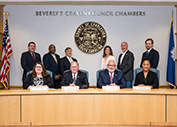Consolidated 9-1-1 Center Frequently Asked Questions
911 System Functionality FAQs
How does 9-1-1 work?
In most cases, when you call 9-1-1 from a landline phone, such as a house, business or pay phone, the call is automatically routed to the appropriate 9-1-1dispatch center. When calling from a landline phone, the telephone number and address are transmitted to the 9-1-1 center and displayed to the dispatcher.
When you call 9-1-1 from a wireless device, such as a cell phone, it is slightly different. Cell phones transmit the signal to the nearest cellular tower, and it then travels to the 9-1-1 center associated with that tower. In some cases, the receiving 9-1-1 center is not the correct agency that you need to respond to your incident, which is why you may have to be transferred to another 9-1-1 center.
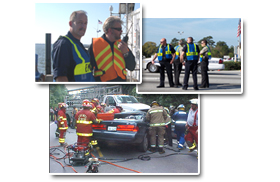 When calling 9-1-1 from a cell phone, the phone number is transmitted to the 9-1-1 center and displayed to the dispatcher. Charleston County has 9-1-1 Phase 2 technology that triangulates the cell phone 's signal and gives an approximate location of where the call originated.
When calling 9-1-1 from a cell phone, the phone number is transmitted to the 9-1-1 center and displayed to the dispatcher. Charleston County has 9-1-1 Phase 2 technology that triangulates the cell phone 's signal and gives an approximate location of where the call originated.
When calling 9-1-1, whether from a landline or wireless device, the dispatcher is going to ask you your location. Location is key in receiving the help you need. The system is not perfect, and there can be discrepancies. This is why the dispatcher must confirm your location.
If you are hearing or speech impaired, Charleston County is equipped with a Text Telephone (TDD/TTY) device that all dispatchers are trained to use.
For those who do not speak English, Charleston County utilizes an interpreter service. The service has interpreters for over 175 languages.
Three ways to contact 9-1-1 for emergencies
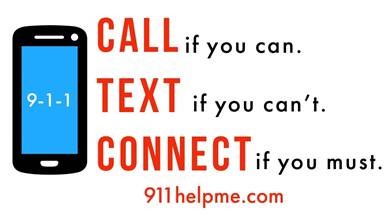
Call if you Can: Making a voice call to 911 is the fastest way to transfer information between caller and call taker, resulting in faster communication to responders.
Text if you Can’t: Sending a text to 911 is a good way to report an emergency if a voice call cannot be made. Examples: Reporting party is deaf or mute, the emergency is imminently dangerous and the caller needs to remain quiet or not let those around them know that they are calling 911, cell phone has very low service or battery. Use plain language/no slang (translation available) and do not send photos, emojis, videos or .gifs as those are not currently accepted by our software.
Connect if you Must: A reporting party should use 911helpme.com if they are unable to call or text. Use any internet-connected device to report an emergency via this website. A photo can be included in a report using this option
Where is the information I am providing going?

While the dispatcher asks you questions, he or she is entering the information into a computer-aided dispatch system (CAD). Other dispatchers can see the information as it is being taken and can send the necessary responders while you are still talking to the dispatcher. Talking to the dispatcher does not delay response. The dispatcher is gathering information that is necessary for the responding units.
When should I call 9-1-1?
Call 9-1-1 to report life threatening emergencies, crimes in progress and other emergency situations that require immediate response.
Some examples of when to call 9-1-1:
- Heart attack or stroke
- Building fire
- Break-in in progress
- Car accidents involving injuries
- Robbery
If you are ever in doubt of whether a situation is an emergency, call 9-1-1 and let the 9-1-1 dispatcher determine if it is an emergency. It is better to be safe than sorry. If the dispatcher determines that your situation is not an emergency, he or she may ask you to call back on a non-emergency, seven-digit administrative line. There are a limited number of 9-1-1 lines, which is why it is very important to make sure that only emergency calls are being taken on 9-1-1.
When should I call the administrative telephone number?
Law Enforcement:
- To report lost or found property
- To add information to a previously investigated incident
- To report a parking complaint
Fire Department:
- To reach someone who works in the main office
- To request information regarding fire service in your area
- To request information regarding burning ordinances, smoke alarms or fire inspections
Medical:
- To reach someone who works in the main office
- To request information regarding medical billing
- To request information regarding additional medical coverage during major events
- Ride alongs
- Lost property
What if I call 9-1-1 by mistake?
If you call 9-1-1 by mistake, do not hang up. Even if you dial 9-1-1 and hang the phone up immediately before even hearing the ring, the call still comes in to the 9-1-1 center. Most Charleston County agencies have a 9-1-1 hang up response plan. If the 9-1-1 center receives a hang up call, a police officer is dispatched to the location to ensure everything is okay. If you stay on the line and tell the dispatcher that it was a mistake and everything is okay, a police officer may not have to respond. The 9-1-1 dispatcher will determine if a response is needed.
Does the 9-1-1 dispatcher know my location?
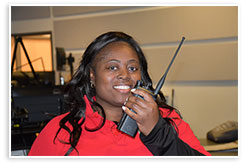
Assume the 9-1-1 dispatcher does not know your location. Some cell phones are able to triangulate the signal and give an approximate location, but you will need to provide the dispatcher with additional location information. Be prepared to give precise directions to your location.
What if I don 't know where I am when I call 9-1-1?
Look for landmarks, large buildings, street signs or paperwork nearby that may contain address information. Think back to the main street or highway you were near when your emergency occurred. If others are around, ask them where you are.
Why is the 9-1-1 dispatcher asking me so many questions?
The dispatcher is the vital link between the public and emergency response personnel. The dispatcher must get information to pass on to the responders to help them more accurately prepare for the situation to which they are responding. In addition, dispatchers are trained to give pre-arrival instructions in some instances, which can help the victim until responders arrive.
While the dispatcher is speaking to me, is help being sent?
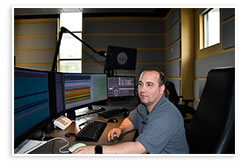
Once the basic information and reason for the 9-1-1 call is obtained, the dispatcher stays on the line with the caller and obtains further information. Another dispatcher simultaneously dispatches the appropriate emergency personnel. In some cases, the 9-1-1 dispatcher will urge the caller to stay on the line until help arrives on scene.
Can I dial 9-1-1 from my VoIP phone?
You can reach emergency assistance by dialing 9-1-1 on most VoIP phones. However, there are important differences between some VoIP 9-1-1 services and traditional 9-1-1 service from a standard phone. Sometimes the 9-1-1 dispatcher may not have a display of the number your calling from or your location. In addition, your call may arrive at a remote private call center if there is confusion over your location.
Do service outages affect my ability to call 9-1-1 from a VoIP phone?
They might. Just as a cordless phone may not work without power, your VoIP phone may not work without power either. As a result, you may be unable to make any calls, including those to 9-1-1, during an electrical outage. Similarly, if your cable or broadband service is interrupted, it may keep you from being able to make outbound calls.
Should I keep my traditional phone line after I subscribe to VoIP service?
Yes. 9-1-1 leaders recommend you have an active land-line phone service in addition to your VoIP phone in order to ensure you can access 9-1-1 services, especially during power or service outages.
Do people actually prank call 9-1-1?
Unfortunately, yes. 9-1-1 centers across the country receive prank calls everyday. There are only a certain number of 9-1-1 lines designated to each particular center. If a dispatcher is tied up on a prank 9-1-1 call, it can delay a real emergency from being answered and handled.
Section 23-47-80 in State of South Carolina code of laws states:
"It is unlawful for a person anonymously or otherwise to:
(1) use any words or language of a profane, vulgar, lewd, lascivious, or indecent nature on an emergency 911 number with the intent to intimidate or harass a dispatcher;
(2) telephone the emergency 911 number, whether or not conversation ensues for the purpose of annoying or harassing the dispatcher or interfering with or disrupting emergency 911 service;
(3) make a telephone call to a 911 dispatcher and intentionally fail to hang up or disengage the connection for the purpose of interfering with or disrupting emergency service;
(4) telephone the emergency 911 number and intentionally make a false report.
A person who violates the provisions of this section is guilty of a misdemeanor and, upon conviction, must be imprisoned not more than six months or fined not more than two hundred dollars, or both.
How do I become a 9-1-1 Emergency Services Dispatcher?

For information on current position openings, visit Charleston County Government's Employment Opportunities page.
Are guest speakers available for a school, business or civic group function?
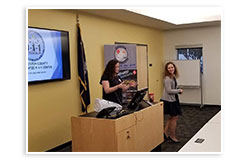
Yes. If you are interested in having a guest speaker at your function, contact DeVonna Perry by e-mail or phone at (843) 529-3745. 9-1-1 training and education demonstrations are available.
Public FAQs
What is the number for the SPCA?
A: 843-747-4849
My dog got picked up, where would they have taken him?
A: Call the Charleston Animal Society 843-743-4849
Someone I know got arrested, where would they have taken him?
A: Call
- Charleston County Detention Center 843-529-7300
- Berkeley County Detention Center 843-719-4546
- Dorchester County Detention Center 843-832-0215
Can you tell me if I have a warrant?
A: That information cannot be provided over the phone. Please go to your local police department to find out that information.
Do I have to go to court if the ticket is checked yes but the officer said no?
A: Call the appropriate court office.
Where do I file for a restraining order?
A: Contact the Magistrate Office in the County where you live.
Who do I contact to find out when and where I need to go to court?
A: Depends on the type of incident:
- If it is a criminal case, then they can call Charleston County Clerk of Court at 843 958 5000.
- If it is a traffic or parking ticket, they should be able to check with the proper agency’s traffic office (if they have one) or the municipal court for that area. Except for City of Charleston, they need to call revenue collections.
Who do I contact to reclaim recovered stolen items?
A: Contact the appropriate agency evidence department.
Where can I get a vehicle release or item release form?
A: Contact the front desk/duty officer/or evidence department at the agency holding the item.
Who do I contact to set up traffic patrol or speed bumps/radar?
A: Contact the Traffic department that supports that area.
Who do I contact for a livability of a residence check (not a welfare check)?
A: Contact the livability office or code enforcement that services that area.
Who do I call about Metal permits/ Scrap metal?
A: Charleston County Sheriff Office (CCSO) records 843-554-2450
Who do I contact for a FOIA request?
A: Contact
- North Charleston: North Charleston FOIA
- City of Charleston: City of Charleston FOIA
- Mount Pleasant: Mount Pleasant FOIA
- IOP: IOP FOIA
- Sullivan’s Island: Sullivan’s Island FOIA
Who do I need to contact to get a Chauffer license in the city of Charleston?
A: Call 843-577-7434 or Charleston Taxi & Limousine Licenses
Who do I need to contact to get a Business/ Food vendor permits in the city of Charleston?
Who do I contact to report election fraud?
A: 833-472-8683
A parking meter isn't working, can I still park here?
A: Call parking enforcement at 843-579-6099.
Who do I contact if I was transported to the hospital by EMS and am unable find my belongings (purse, wallet, ID, insurance card, etc.)?
A: EMS Headquarters at (843)202-6700
Will EMS transport me to my doctor’s appointment?
A: Charleston County EMS does not provide routine convalescent transportation, such as taking people home from the hospital or to clinics or private doctor's offices. Please call a private ambulance service.
What is the number to the fire department?
A: Please call the headquarters location for your agency.
- Awendaw McClellanville Fire Department 843-856-1617
- City of Charleston Fire Department 843-720-1981
- Folly Beach Fire Department 843-588-7003
- Isle of Palms Fire Department 843-886-4410
- James Island Public Safety District 843-762-5245
- Mount Pleasant Fire Department 843-884-0623
- North Charleston Fire Department 843-740-2616
- Saint Andrews Fire Department 843-556-8951
- Saint Johns Fire Department 843-559-9194
- Saint Pauls Fire Department 843-889-8874
- Sullivan’s Island Fire Department 843-883-9636
Will the fire department install a smoke detector or change the batteries in my current smoke detector in my house?
A: Yes, please call your local Fire Department. The phone numbers for the headquarters are listed above.
Who do I call for a burn permit?
A: 1-800-986-3593
Will the fire department refill my fire extinguisher?
A: No, please call a fire extinguisher maintenance company.
My power is out. Can the fire department turn it back on?
A: No. You will need to contact your power company.
